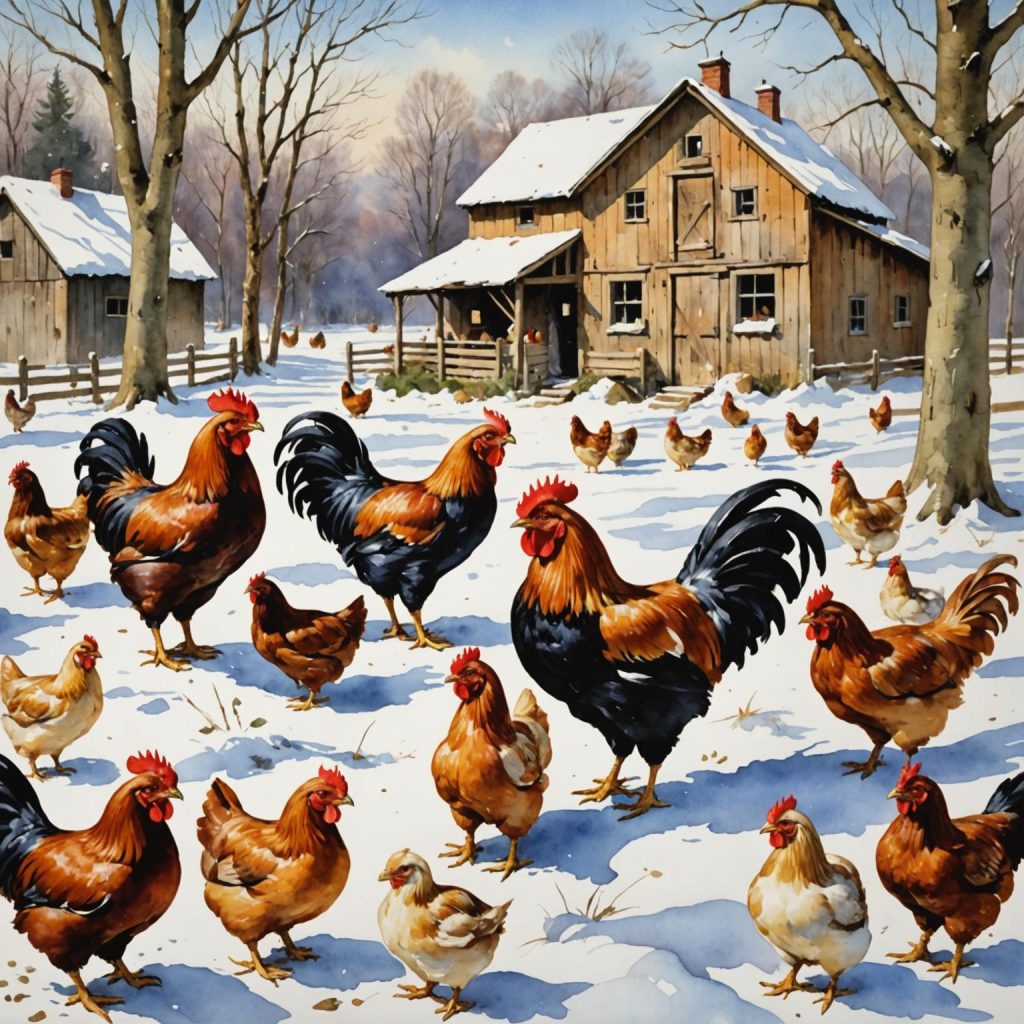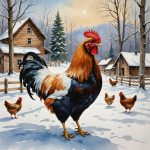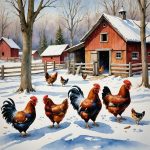Cold weather can have a significant impact on chickens, affecting their health, egg production, and overall well-being. When temperatures drop, chickens can experience stress, decreased egg production, and even frostbite. Chickens are more susceptible to cold weather because they lack the ability to regulate their body temperature like mammals do. As a result, it is crucial for chicken owners to understand the effects of cold weather on their flock and take appropriate measures to ensure their chickens remain healthy and productive during the winter months.
In cold weather, chickens will naturally try to conserve heat by fluffing up their feathers and huddling together. However, prolonged exposure to low temperatures can still lead to health issues such as respiratory problems, decreased immune function, and reduced egg production. Additionally, extreme cold can cause frostbite on a chicken’s comb, wattles, and feet, which can be painful and potentially lead to infection if not treated promptly. It is important for chicken owners to be aware of these potential issues and take steps to protect their flock from the negative effects of cold weather.
Table of Contents
- 1 Providing Proper Shelter and Insulation for Chickens
- 2 Adjusting Feeding and Watering Practices for Winter
- 3 Managing Lighting to Stimulate Egg Production
- 4 Implementing Strategies to Keep Eggs from Freezing
- 5 Monitoring and Managing Health and Wellness of Chickens in Winter
- 6 Maintaining Egg Production in Winter
Providing Proper Shelter and Insulation for Chickens
One of the most important steps in preparing chickens for cold weather is to provide them with proper shelter and insulation. A well-ventilated but draft-free coop is essential for keeping chickens warm and healthy during the winter months. The coop should be insulated to help retain heat and prevent drafts, but it is also important to ensure that there is adequate ventilation to prevent moisture buildup, which can lead to respiratory issues. Additionally, providing plenty of bedding such as straw or wood shavings can help insulate the coop and provide a comfortable environment for the chickens.
In addition to a well-insulated coop, it is important to provide outdoor shelter for chickens to protect them from wind, snow, and rain. This can be in the form of a covered run or a windbreak such as a tarp or bales of hay. Providing a dry, sheltered area for chickens to spend time outdoors can help prevent stress and keep them healthy during the winter months. By providing proper shelter and insulation, chicken owners can help their flock stay warm and comfortable even in the coldest of temperatures.
Adjusting Feeding and Watering Practices for Winter
In cold weather, chickens require additional energy to maintain their body temperature and stay warm. As a result, it is important to adjust feeding practices to ensure that chickens are getting enough nutrients and calories to support their increased energy needs. This can be done by providing a higher protein feed or supplementing their diet with additional protein sources such as mealworms or black soldier fly larvae. Additionally, providing access to fresh, clean water is crucial in cold weather, as chickens can easily become dehydrated when temperatures drop. It is important to regularly check waterers for freezing and provide warm water if necessary to ensure that chickens have access to water at all times.
In addition to adjusting feeding practices, it is important to monitor the body condition of chickens during the winter months. Chickens that are too thin may struggle to stay warm, while overweight chickens may have difficulty regulating their body temperature. By monitoring their body condition and adjusting feeding practices as needed, chicken owners can help ensure that their flock remains healthy and well-nourished throughout the winter.
Managing Lighting to Stimulate Egg Production
During the winter months, the shorter days can have a significant impact on egg production in chickens. As daylight hours decrease, chickens naturally reduce their egg production or stop laying altogether. To help stimulate egg production during the winter months, it is important to manage lighting in the coop. By providing artificial light in the early morning or evening hours, chicken owners can help extend the daylight hours for their flock and encourage continued egg production.
It is important to gradually introduce artificial lighting to the coop to mimic natural daylight patterns and prevent stress on the chickens. Using a timer to control the lighting schedule can help ensure that chickens receive consistent light exposure each day. By managing lighting in the coop, chicken owners can help maintain egg production throughout the winter months and ensure a steady supply of fresh eggs.
Implementing Strategies to Keep Eggs from Freezing
In cold weather, it is important to implement strategies to prevent eggs from freezing in the coop. Frozen eggs can crack and become inedible, leading to a loss of valuable resources for chicken owners. To prevent eggs from freezing, it is important to collect eggs frequently throughout the day and provide proper storage in a cool but not freezing environment. Additionally, providing nesting boxes with plenty of clean bedding can help insulate eggs and prevent them from freezing.
In addition to collecting eggs frequently, it is important to provide proper storage for eggs to prevent them from freezing. This can be done by storing eggs in a cool but not freezing environment such as a root cellar or unheated room. By implementing these strategies, chicken owners can help ensure that their eggs remain fresh and edible throughout the winter months.
Monitoring and Managing Health and Wellness of Chickens in Winter
During the winter months, it is important to monitor the health and wellness of chickens closely to prevent potential issues such as respiratory problems, frostbite, or decreased immune function. Regular health checks can help identify any issues early on and prevent them from becoming more serious. Additionally, providing regular access to dust baths can help chickens maintain healthy feathers and skin even in cold weather.
In addition to monitoring their health, it is important to provide opportunities for exercise and mental stimulation for chickens during the winter months. This can be done by providing enrichment activities such as hanging treats or toys in the coop or allowing chickens access to a larger outdoor area when weather permits. By monitoring and managing the health and wellness of chickens in winter, chicken owners can help ensure that their flock remains healthy and happy throughout the colder months.
Maintaining Egg Production in Winter
In conclusion, maintaining egg production in winter requires careful attention to the needs of chickens in cold weather. By understanding the effects of cold weather on chickens, providing proper shelter and insulation, adjusting feeding and watering practices, managing lighting, implementing strategies to keep eggs from freezing, and monitoring and managing health and wellness, chicken owners can help ensure that their flock remains healthy and productive throughout the winter months. With proper care and attention, chickens can continue to lay eggs even in cold weather, providing a valuable source of nutrition for their owners. By implementing these strategies, chicken owners can help maintain egg production in winter and ensure that their flock remains healthy and happy year-round.
Meet Walter, the feathered-friend fanatic of Florida! Nestled in the sunshine state, Walter struts through life with his feathered companions, clucking his way to happiness. With a coop that’s fancier than a five-star hotel, he’s the Don Juan of the chicken world. When he’s not teaching his hens to do the cha-cha, you’ll find him in a heated debate with his prized rooster, Sir Clucks-a-Lot. Walter’s poultry passion is no yolk; he’s the sunny-side-up guy you never knew you needed in your flock of friends!







